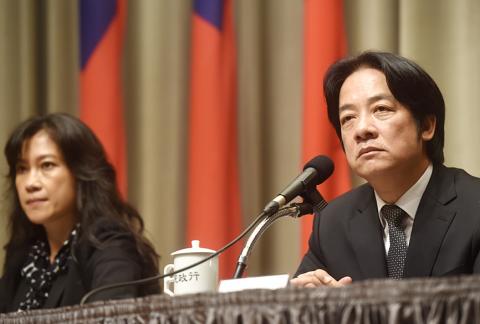Premier William Lai (賴清德) and Presidential Office Secretary-
General Chen Chu (陳菊) have decided to remain in their posts in the interest of continuity, after offering to step down to take responsibility for the Democratic Progressive Party’s (DPP) crushing losses in Saturday’s nine-in-one elections.
The DPP won only six of the 22 city mayor and county commissioner seats nationwide, while the Chinese Nationalist Party (KMT) won 15.

Photo: Chien Jung-fong, Taipei Times
Lai, who took office in September last year, tendered his resignation on Saturday, but President Tsai Ing-wen (蔡英文) said she would not accept it.
At a news conference yesterday, Lai said that after talking with Tsai the previous day he had decided to stay on as premier to help advance the government’s policies.
“The election results showed that many people in Taiwan are unhappy with the government’s performance, but the nation needs continuity in government policy, so I will stay on to ensure political stability,” Lai said.
“I promise that the Cabinet will work with all local governments and provide them with the necessary assistance for major development projects throughout the nation to improve public welfare,” he said.
Asked whether there would be a Cabinet reshuffle, the premier said he would make adjustments at an appropriate time in line with public expectations.
Chen has also retracted her decision to resign, the Presidential Office said.
In a statement yesterday, Presidential Office spokesman Alex Huang (黃重諺) said that Chen decided to stay on in the interest of political stability.
Several DPP lawmakers have expressed their desire to see a Cabinet reshuffle before the Lunar New Year.
However, Legislative Speaker Su Jia-chyuan (蘇嘉全) said that an election loss cannot be attributed to a single cause, but is a combination of multiple factors.
If everyone resigns because they think they were the cause, then everyone would have to resign, he said.
Right now, the focus should be on stabilizing the political situation, he said, adding that political stability is a concern not only for a political party, but also the public.
If the DPP stabilizes the political situation and moves in the right direction, it could still win the hearts of the public, he added.
DPP members are also reassessing the relationship between its legislators and the administration.
The drafting of legislation needs to be a collective decision made by the party caucus, DPP Legislator Lee Chun-yi (李俊俋) said.
In the past, most of the time the Executive Yuan would create a policy, and the Legislative Yuan would “clean up the mess and defend it,” he said.
Before any policy is formed, it should respect the views of legislators, he added.
DPP Legislator Rosalia Wu (吳思瑤) said she hoped that DPP lawmakers could participate in the executive branch’s policymaking process — not to interfere with the Executive Yuan’s administrative power, but to use their grasp of public opinion to help the administration create policies that better meet the needs of the public.

CHAOS: Iranians took to the streets playing celebratory music after reports of Khamenei’s death on Saturday, while mourners also gathered in Tehran yesterday Iranian Supreme Leader Ayatollah Ali Khamenei was killed in a major attack on Iran launched by Israel and the US, throwing the future of the Islamic republic into doubt and raising the risk of regional instability. Iranian state television and the state-run IRNA news agency announced the 86-year-old’s death early yesterday. US President Donald Trump said it gave Iranians their “greatest chance” to “take back” their country. The announcements came after a joint US and Israeli aerial bombardment that targeted Iranian military and governmental sites. Trump said the “heavy and pinpoint bombing” would continue through the week or as long

TRUST: The KMT said it respected the US’ timing and considerations, and hoped it would continue to honor its commitments to helping Taiwan bolster its defenses and deterrence US President Donald Trump is delaying a multibillion-dollar arms sale to Taiwan to ensure his visit to Beijing is successful, a New York Times report said. The weapons sales package has stalled in the US Department of State, the report said, citing US officials it did not identify. The White House has told agencies not to push forward ahead of Trump’s meeting with Chinese President Xi Jinping (習近平), it said. The two last month held a phone call to discuss trade and geopolitical flashpoints ahead of the summit. Xi raised the Taiwan issue and urged the US to handle arms sales to

State-run CPC Corp, Taiwan (CPC, 台灣中油) yesterday said that it had confirmed on Saturday night with its liquefied natural gas (LNG) and crude oil suppliers that shipments are proceeding as scheduled and that domestic supplies remain unaffected. The CPC yesterday announced the gasoline and diesel prices will rise by NT$0.2 and NT$0.4 per liter, respectively, starting Monday, citing Middle East tensions and blizzards in the eastern United States. CPC also iterated it has been reducing the proportion of crude oil imports from the Middle East and diversifying its supply sources in the past few years in response to geopolitical risks, expanding

Pro-democracy media tycoon Jimmy Lai’s (黎智英) fraud conviction and prison sentence were yesterday overturned by a Hong Kong court, in a surprise legal decision that comes soon after Lai was jailed for 20 years on a separate national security charge. Judges Jeremy Poon (潘兆初), Anthea Pang (彭寶琴) and Derek Pang (彭偉昌) said in the judgement that they allowed the appeal from Lai, and another defendant in the case, to proceed, as a lower court judge had “erred.” “The Court of Appeal gave them leave to appeal against their conviction, allowed their appeals, quashed the convictions and set aside the sentences,” the judges